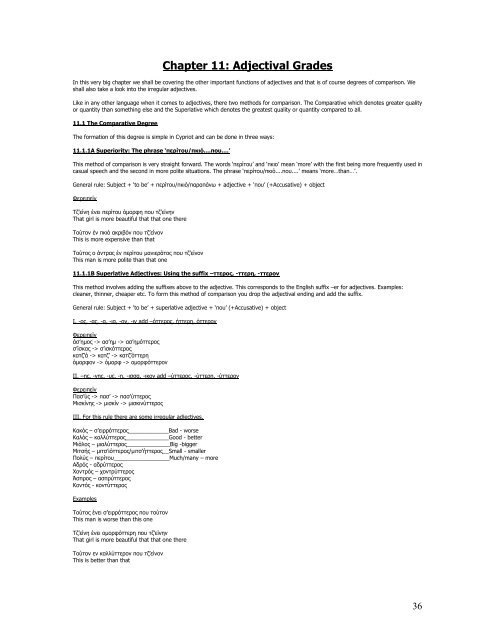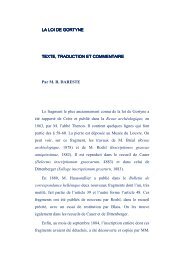CYPRIOT GRAMMAR
CYPRIOT GRAMMAR
CYPRIOT GRAMMAR
You also want an ePaper? Increase the reach of your titles
YUMPU automatically turns print PDFs into web optimized ePapers that Google loves.
Chapter 11: Adjectival Grades<br />
In this very big chapter we shall be covering the other important functions of adjectives and that is of course degrees of comparison. We<br />
shall also take a look into the irregular adjectives.<br />
Like in any other language when it comes to adjectives, there two methods for comparison. The Comparative which denotes greater quality<br />
or quantity than something else and the Superlative which denotes the greatest quality or quantity compared to all.<br />
11.1 The Comparative Degree<br />
The formation of this degree is simple in Cypriot and can be done in three ways:<br />
11.1.1Α Superiority: The phrase ‘περίτου/πκιό....που....’<br />
This method of comparison is very straight forward. The words ‘περίτου’ and ‘πκιο’ mean ‘more’ with the first being more frequently used in<br />
casual speech and the second in more polite situations. The phrase ‘περίτου/πκιό....που....’ means ‘more…than…’.<br />
General rule: Subject + ‘to be’ + περίτου/πκιό/παραπάνω + adjective + ‘που’ (+Accusative) + object<br />
Φερειπείν<br />
Τζ’είνη ένει περίτου όμορφη που τζ’είνην<br />
That girl is more beautiful that that one there<br />
Τούτον έν πκιό ακριβόν που τζ’είνον<br />
This is more expensive than that<br />
Τούτος ο άντρας έν περίτου μανιεράτος που τζ’είνον<br />
This man is more polite than that one<br />
11.1.1Β Superlative Adjectives: Using the suffix –ττερος, -ττερη, -ττερον<br />
This method involves adding the suffixes above to the adjective. This corresponds to the English suffix –er for adjectives. Examples:<br />
cleaner, thinner, cheaper etc. To form this method of comparison you drop the adjectival ending and add the suffix.<br />
General rule: Subject + ‘to be’ + superlative adjective + ‘που’ (+Accusative) + object<br />
Ι. -ος, -ας, -α, -ια, -ον, -ιν add –όττερος, ήττερη, όττερον<br />
Φερειπείν<br />
άσ’ημος -> ασ’ημ -> ασ’ημόττερος<br />
σ’ίσκας -> σ’ισκόττερος<br />
κατζ’ά -> κατζ’ -> κατζ’όττερη<br />
όμορφον -> όμορφ -> ομορφόττερον<br />
ΙΙ. –ης, -νης, -υς, -η, -ισσα, -ικον add –ύττερος, -ύττερη, -ύττερον<br />
Φερειπείν<br />
Πασ’ύς -> πασ’ -> πασ’ύττερος<br />
Μισκίνης -> μισκίν -> μισκινύττερος<br />
III. For this rule there are some irregular adjectives.<br />
Κακός – σ’ειρρόττερος_____________Bad - worse<br />
Καλός – καλλύττερος______________Good - better<br />
Μιάλος – μιαλύττερος______________Big -bigger<br />
Μιτσής – μιτσ’ιόττερος/μιτσ’ήττερος__Small - smaller<br />
Πολύς – περίτου__________________Much/many – more<br />
Αδρός - αδρύττερος<br />
Χοντρός – χοντρύττερος<br />
Άσπρος – ασπρύττερος<br />
Κοντός - κοντύττερος<br />
Examples<br />
Τούτος ένει σ’ειρρόττερος που τούτον<br />
This man is worse than this one<br />
Τζ’είνη ένει ομορφόττερη που τζ’είνην<br />
That girl is more beautiful that that one there<br />
Τούτον εν καλλύττερον που τζ’είνον<br />
This is better than that<br />
36





